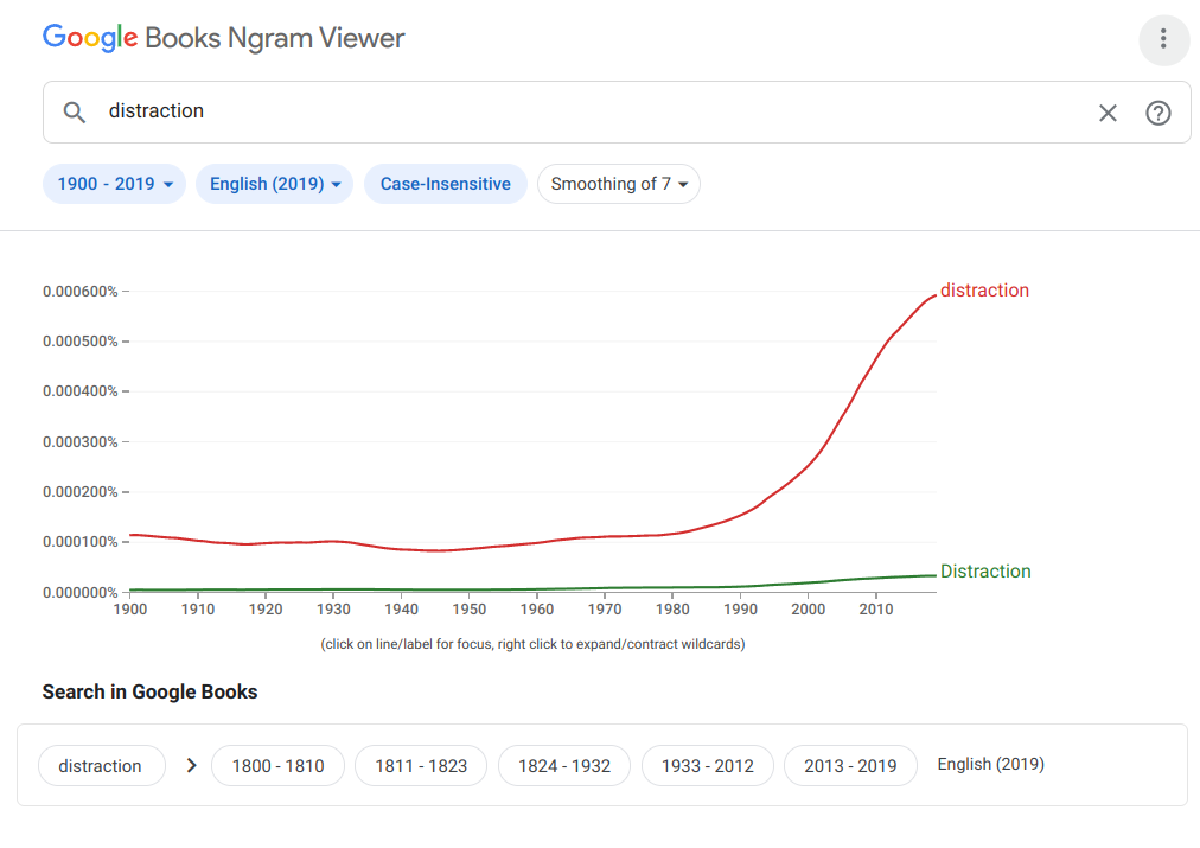We all get distracted.
Being prone to distraction is fundamental to human nature, but over the last couple decades the problem has become much, much worse.
And people are more aware of it too. Just take a look at this graph:

We are more anxious, we get less done, we miss an opportunity to leave a mark on the world because we are pulled in so many directions all at once.
Many companies compete for our attention creating more and more engaging content. Even articles like this one might be distracting you right now!
What is a distraction really?
Like a proper nerd, I like to start with the definition:
Distraction: something that distracts : an object that directs one’s attention away from something else
Distraction is fundamentally about the “context switch”, about moving away from a thing you are currently doing or want to be doing. It’s about being pulled into many different directions, about not being intentional, but being reactive.
The opposite of distraction is traction. Traction happens when you focus and make meaningful progress on your goals or generally when you act in line with your intentions.
This means that what is a distraction for a given person in a given moment depends on their current goals.
Tips to avoid distractions
Since we got the definition out of the way, we are ready to get into my best tips to avoid distractions:
- Define your priorities
- Change your environment
- Pay attention to your mental health
- Make time for rest, recovery and entertainment
- Plan ways to break out of distraction
Let’s dive in!
1. Define your priorities
The first step to fighting distractions is finding your traction.
If you don’t know what your priorities are, you won’t even know that you are distracted. You will just be pulled in a million directions and will get stuck.
On the other hand, once you establish some momentum on your priorities it will be easier to stay the course. “A body in motion tends to stay in motion”.
“A body in motion tends to stay in motion unless acted on by an outside force.” — Isaac Newton
Intention starts with clarity.
2. Change your environment
If you don’t want to eat chocolate cookies at home, don’t buy them and don’t bring them home.
Similarly, if you don’t want to be distracted by your phone, turn it off and put it away. If that’s too drastic, uninstall some apps. Make it harder to fall into the trap.
It’s not 100% full proof, because if you are motivated enough, you can still fall back into bad habits, but tools like blocksite and others that I describe in this article can be a great help.
3. Pay attention to your mental health
Many people don’t realize that we often turn to distractions to release stress.
I used to check facebook many times per day. I wasn’t aware that stress was my primary trigger until I started blocking the mindless habit and that caused me to reflect on it.
The problem is that engaging in this type of a distraction wouldn’t provide actual relief or solve any of my real life problems. It would temporarily distract me, but I would still remain stressed overall.
A better solution to my stress would be to meditate, take a walk or maybe get help by a professional.
I think this problem is much more common than people think. You might think that maybe you are just lazy and undisciplined, but it could be stress or other mental health issues that you need to prioritize.
Getting distracted could be just a symptom, not the actual root of the problem.
4. Make time for rest, recovery and entertainment
If you are reading it, it’s quite likely that you are a very ambitious person. If you only work and never rest, it won’t be sustainable. You need time to recharge your batteries from time to time.
If you don’t budget for rest and entertainment, your body and mind might revolt against your strong will. You might get distracted at best or you might get sick at worst.
It’s much healthier to actively plan your “downtime” and fun than to end up mindlessly distracted or really burned out.
5. Plan ways to break out of distraction
A big part of the mindfulness practice is realizing that you are getting distracted and returning back to focus. It’s similar with avoiding distractions.
Even if you have the strongest will and the best distraction free environment, you will get distracted. It will happen sooner or later, so it’s best to have a plan.
So how to shorten an unproductive distraction? Some ideas:
- Other people can get you out of it (like a spouse, friend or parents bringing you to your senses :) )
- Timers and Alarms on the phone (e.g. I have a “Time to prepare to sleep alarm”)
- Tools that will block you wellbeing timers, or browser extensions such as watchlimits (for video watching)
Summary
I hope this article will help you be more intentional and less distracted. Please share your tips with me! And if you want to help me out, please follow me on twitter or try out watchlimits.